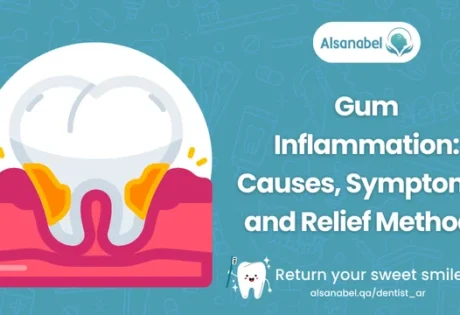
Gum swelling is a common oral health concern that can cause discomfort, pain, and even difficulty in eating and speaking. Many people experience swollen gums at some point in their lives, but not everyone knows why do gums swell or how to effectively treat the condition. Swollen gums can be a result of poor oral hygiene, infections, nutritional deficiencies, or even allergies. Identifying the gum swelling causes is essential for effective treatment and long-term oral health.
If you are looking for swollen gums home remedies or need to know how to reduce gum swelling, this article will provide a comprehensive guide to understanding the causes, symptoms, and treatments for gum inflammation.
Why Do Gums Swell? Common Causes of Gum Swelling
There are numerous reasons why gums become swollen, ranging from mild irritation to serious health concerns. Here are some of the most common gum swelling causes:

1. Poor Oral Hygiene and Plaque Buildup
One of the leading gum swelling causes is inadequate oral hygiene. When plaque, a sticky film of bacteria, builds up on the teeth and gums, it leads to inflammation.
- If plaque is not removed through regular brushing and flossing, it hardens into tartar, which irritates the gums and causes them to swell.
- Gingivitis, the early stage of gum disease, often begins with mild swelling, redness, and bleeding gums.
2. Gum Disease (Gingivitis and Periodontitis)
When gingivitis is not treated, it can progress into periodontitis, a more severe form of gum disease that causes:
- Gum recession
- Persistent swelling
- Loose teeth
- Deep pockets of infection in the gums
Without prompt treatment, gum disease can lead to permanent damage to the gums and underlying bone structures.
3. Food Particles Stuck Between Teeth
Small food particles, especially from hard or fibrous foods, can get trapped between the teeth and gums, leading to irritation and inflammation.
- If not removed, food debris attracts bacteria, increasing the risk of infection and swelling.
- Flossing and rinsing the mouth thoroughly can help prevent this issue.
4. Hormonal Changes
Hormonal fluctuations can affect the gums, making them more sensitive and prone to swelling.
- Pregnancy gingivitis is common due to increased progesterone levels, which promote gum inflammation.
- Menstruation and menopause can also trigger gum swelling and tenderness.
Maintaining good oral hygiene during hormonal changes is essential to prevent excessive gum inflammation.
5. Vitamin Deficiencies
Can vitamin deficiencies cause gum swelling?
Yes, a lack of essential vitamins can weaken the gums, leading to swelling and increased susceptibility to infections.
- Vitamin C deficiency can cause scurvy, a condition that leads to swollen, bleeding gums.
- Vitamin K deficiency affects blood clotting, making gums more prone to inflammation and bleeding.
Eating a well-balanced diet with plenty of fruits, vegetables, and leafy greens can help maintain gum health.
6. Allergic Reactions to Dental Products or Food
Can allergies cause swollen gums?
Yes, allergic reactions to certain toothpaste, mouthwashes, or dental products can irritate the gums and cause swelling.
- Ingredients such as sodium lauryl sulfate (SLS) in toothpaste may trigger irritation in some individuals.
- Certain foods, particularly nuts, shellfish, and acidic fruits, can cause gum inflammation in people with food allergies.
Switching to hypoallergenic dental products and avoiding trigger foods can help alleviate symptoms.
7. Smoking and Tobacco Use
Tobacco use weakens the immune system, making it harder for the gums to fight infections.
- Smoking reduces blood flow to the gums, leading to delayed healing and increased swelling.
- Smokers are at a higher risk of developing gum disease and oral infections.
Quitting smoking can significantly improve gum health and reduce inflammation.
8. Infections (Bacterial, Viral, and Fungal)
Is swollen gum a sign of an abscess?
Yes, swollen gums can indicate an underlying abscess, which is a pus-filled infection caused by bacteria.
- Dental abscesses occur when bacteria enter the gum tissue, leading to severe swelling, pain, and pus formation.
- Viral infections, such as herpes simplex, can cause painful gum blisters and inflammation.
- Oral thrush, a fungal infection caused by Candida, leads to white patches and gum swelling.
If an abscess is suspected, it requires immediate dental treatment to prevent further complications.
9. Side Effects of Medications
Certain medications can contribute to gum swelling by affecting saliva production and gum tissue health.
- Antihypertensive drugs (used for blood pressure control) may cause gum overgrowth.
- Antidepressants and antihistamines can reduce saliva flow, leading to dry mouth and gum inflammation.
Consulting a doctor or dentist about alternative medications may help manage this issue.
How to Reduce Gum Swelling: Home and Professional Treatments
If you’re experiencing swollen gums and pain, there are several effective swollen gums home remedies that can provide relief.
1. Salt Water Rinse
A salt water rinse helps reduce inflammation and eliminate bacteria.
How to use:
- Dissolve ½ teaspoon of salt in a cup of warm water.
- Swish in your mouth for 30 seconds, then spit it out.
- Repeat twice daily.
2. Cold Compress
Applying a cold compress to the outside of the cheek can help numb the area and reduce swelling.
How to use:
- Wrap an ice pack in a cloth and hold it against the affected area for 10 minutes.
- Repeat every few hours as needed.
3. Aloe Vera Gel
Aloe vera has antibacterial and anti-inflammatory properties that can help soothe gum swelling.
How to use:
- Apply fresh aloe vera gel directly to swollen gums.
- Leave it on for 10 minutes, then rinse your mouth.
4. Hydrogen Peroxide Rinse
A hydrogen peroxide rinse can help kill bacteria and reduce inflammation.
How to use:
- Mix equal parts of 3% hydrogen peroxide and water.
- Swish in your mouth for 30 seconds, then spit it out.
5. Maintain Proper Oral Hygiene
- Brush twice a day using fluoride toothpaste.
- Use a soft-bristled toothbrush to avoid further irritation.
- Floss daily to remove plaque and food particles.
6. Visit Your Dentist for Professional Cleaning
If gum swelling persists, a professional scaling and root planing procedure may be necessary to remove tartar buildup and bacteria beneath the gumline.
Frequently Asked Questions About Gum Swelling

1. Why do my gums swell suddenly?
Sudden gum swelling can result from food particles stuck between teeth, infections, allergic reactions, or hormonal changes.
2. Can allergies cause swollen gums?
Yes, allergic reactions to toothpaste, mouthwash, or certain foods can trigger gum inflammation.
3. Is swollen gum a sign of an abscess?
Yes, severe swelling accompanied by pain, pus, or fever may indicate a dental abscess, requiring immediate treatment.
4. How does poor oral hygiene contribute to gum swelling?
Poor oral hygiene allows plaque buildup, leading to gingivitis, tartar formation, and bacterial infections that cause gum inflammation.
5. Can vitamin deficiencies cause gum swelling?
Yes, vitamin C and vitamin K deficiencies can weaken gum tissue and increase the risk of swelling and infections.
Understanding the gum swelling causes and learning how to reduce gum swelling can help prevent long-term oral health issues. By maintaining proper oral hygiene, eating a nutrient-rich diet, and using effective swollen gums home remedies, individuals can alleviate discomfort and protect their gum health. If gum swelling persists, consulting a dentist for professional treatment is highly recommended.
%20(2).jpg)

